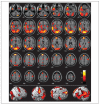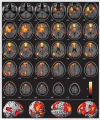Infection, incest, and iniquity: investigating the neural correlates of disgust and morality
- PMID: 18345982
- PMCID: PMC3969035
- DOI: 10.1162/jocn.2008.20109
Infection, incest, and iniquity: investigating the neural correlates of disgust and morality
Abstract
Disgust, an emotion related to avoiding harmful substances, has been linked to moral judgments in many behavioral studies. However, the fact that participants report feelings of disgust when thinking about feces and a heinous crime does not necessarily indicate that the same mechanisms mediate these reactions. Humans might instead have separate neural and physiological systems guiding aversive behaviors and judgments across different domains. The present interdisciplinary study used functional magnetic resonance imaging (n = 50) and behavioral assessment to investigate the biological homology of pathogen-related and moral disgust. We provide evidence that pathogen-related and sociomoral acts entrain many common as well as unique brain networks. We also investigated whether morality itself is composed of distinct neural and behavioral subdomains. We provide evidence that, despite their tendency to elicit similar ratings of moral wrongness, incestuous and nonsexual immoral acts entrain dramatically separate, while still overlapping, brain networks. These results (i) provide support for the view that the biological response of disgust is intimately tied to immorality, (ii) demonstrate that there are at least three separate domains of disgust, and (iii) suggest strongly that morality, like disgust, is not a unified psychological or neurological phenomenon.
Figures






References
-
- Blair J, Marsh AA, Finger E, Blair KS, Luo J. Neuro-cognitive systems involved in morality. Philosophical Explorations. 2006;9:13–27.
-
- Bloom P. Descartes’ baby: How the science of child development explains what makes us human. Basic Books; New York: 2004.
-
- Calder AJ. Disgust discussed. Annals of Neurology. 2003;53:427–428. - PubMed
-
- Calder AJ, Keane J, Manes F, Antoun N, Young AW. Impaired recognition and experience of disgust following brain injury. Nature Neuroscience. 2000;3:1077–1078. - PubMed
MeSH terms
Substances
Grants and funding
LinkOut - more resources
Full Text Sources
Other Literature Sources

